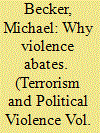|
|
|
Sort Order |
|
|
|
Items / Page
|
|
|
|
|
|
|
| Srl | Item |
| 1 |
ID:
134481


|
|
|
|
|
| Summary/Abstract |
The rise in lone wolf terrorist attacks worldwide in recent decades makes understanding the types of targets lone wolves choose a crucial locus of research, yet this topic remains understudied. In light of this lacuna, this article analyzes 84 lone wolf terrorist attacks that occurred in the United States between 1940 and 2012, identifies patterns in lone wolf target selection, and proposes and tests causal explanations for these patterns. I find that (1) a majority of lone wolves select civilian targets in familiar areas and (2) this is due to their relative weakness and their ideology.
|
|
|
|
|
|
|
|
|
|
|
|
|
|
|
|
| 2 |
ID:
189458


|
|
|
|
|
| Summary/Abstract |
In an important subset of armed conflicts, there is a large disparity between the belligerents’ capabilities. Although the outcomes of such wars cannot be predicted with absolute certainty, the chances that a weak state will triumph are often so low that private information is not a satisfying explanation for conflict. Under which circumstances, then, does the disadvantaged side give in rather than attempting to fight? And what explains variation in effort levels by strong states? I present a model of an environment in which a strong state faces political pressure to replace the losing government following a costly war. I show that there is a non-monotonic relationship between the effort the winning state devotes to the war and the probability that the losing state surrenders – when war effort is low, the weaker state fights because it has a decent chance of winning; when it is high, the weak state fights because it recognizes that it will be replaced upon surrender. Further results are derived to explain the domestic political foundations of variation in strong states’ investments in lopsided conflicts. The results help rationalize a number of historical instances of lopsided conflict.
|
|
|
|
|
|
|
|
|
|
|
|
|
|
|
|
| 3 |
ID:
144883


|
|
|
|
|
| Summary/Abstract |
In “Key Issues and Research Agendas in Lone Wolf Terrorism,” published in Issue 3 of 2015, Ramón Spaaij and Mark S. Hamm (hereafter SH) mount an extended critique of the field of lone wolf terrorism studies, arguing that it suffers from significant definitional, methodological, and inferential issues. They are particularly critical of my article, “Explaining Lone Wolf Target Selection in the United States,” arguing that it “brings into sharp relief a number of key issues regarding the quality and rigor of lone wolf terrorism research.” This article, which analyzed a database of 84 lone wolf attacks that took place in the United States between 1940 and 2012, had three main findings regarding the process by which American lone wolves choose targets: (1) that lone wolves are constrained by their relative weakness compared to violent organizations, and must thus select “softer,” usually civilian targets; (2) that this relative weakness also drives them to use firearms, mainly, as the weapon of choice; and (3) that lone wolves choose targets at the intersection of their daily routines—for example, the route they take to and from work—and the ideology that they claim drives their behavior. For example, antigovernment lone wolves tend to select targets symbolic of government—monuments, courthouses, and so on—that are located in familiar areas. SH do not, in general, dispute these findings, but rather call into question the validity of some of the methods and approaches used to arrive at them.
|
|
|
|
|
|
|
|
|
|
|
|
|
|
|
|
| 4 |
ID:
152869


|
|
|
|
|
| Summary/Abstract |
Previous scholarship on variations in violence within a given terrorist organization has primarily focused on factors that lead to the inception or destruction of that organization. However, violence varies substantially even during the “prime” of an organization's life. This article aims to understand why violence varies in the short term within many organizations, and places a special focus on declines in violence. Specifically, I argue that terrorists face countervailing incentives in terms of how much violence to use, and that when declines in violent activity do occur, they can be divided into two types: a) elective declines, which are usually temporary and used for organizational or reputational recovery; and b) imposed declines, which are dictated by changes in the relative capability of an organization, and are more likely to be permanent. The causal pathways to each type of decline are discussed, and a plausibility probe, consisting of case studies of three terrorist organizations, is then developed to substantiate this theory. The findings have notable implications for counterterrorism policy, as they illustrate not only when and why terrorists choose to curtail violent attacks, but also the conditions that determine whether declines in violence are temporary or permanent.
|
|
|
|
|
|
|
|
|
|
|
|
|
|
|
|
|
|
|
|
|